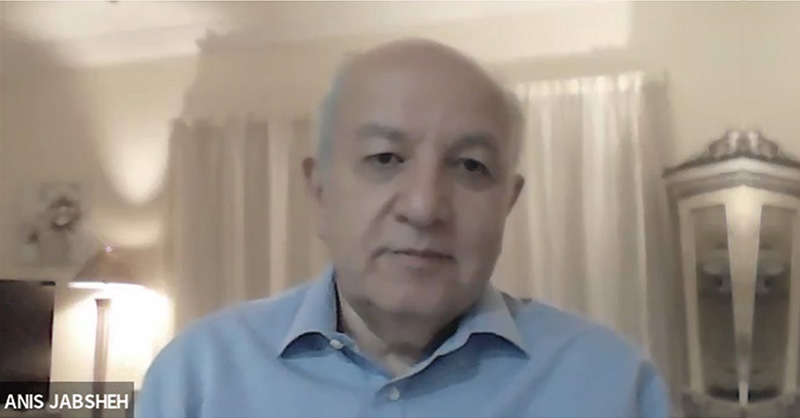Anis Jabsheh CMC©
Professional standards and ethics shaping the future of the consulting profession while helping to accommodate the changes brought about by powerful global drivers were the subject of an online discussion on 14 July 2022 as part of the ICMCI Future of Management Consultancy initiative. The panellists included Dr. Ilse Andrea Ennsfellner CMC CSE, Anis Jabsheh CMC and Balazs Mezosi CMC. The conversation was moderated by Celal Seçkin CMC, ICMCI Professional Standards Committee Chair.
Anis Jabsheh CMC delved into the topic of stakeholders and their importance for consulting engagements.
In many cases, consultants focus on the mechanics of delivering assignments and fulfilling scope of work and the requirements of projects. Thus, they sometimes tend to overlook the importance of stakeholders and how to manage them.
A stakeholder is defined as is an individual or a group of people who have influence on the outcome and the operations of an organisation and its decision-making. Stakeholders affect positively, or negatively in some cases, how an assignment is carried out.
Stakeholders are divided into two main categories:
- Internal, such as employees, department heads, the CEO, the Board of Directors
- External, such as the government, regulators, customers, shareholders.
It is important for consultants to be aware of these influences when they plan consulting assignments in order to execute them successfully.
Furthermore, consulting service providers need to identify not only the internal stakeholders in an organisation but also those that have an external influence. For example, if a company is working on a consulting assignment for an investment company, it could be influenced by laws introduced by the central bank or by the financial authorities. Those external elements could exert an indirect influence on how the organisation will proceed to shape its operations.
Thus, ethics, independence, integrity, standards and risk take on an essential role in addition to the technicalities of executing projects and consulting assignments. Consultants strive to answer the obvious questions in a project, such as: How to design and improve a marketing process? How to design a new organisation structure? However, these are examples of technicalities while the fundamental process of shaping the engagement correctly through stakeholders is essential.
The role of stakeholders is of utmost importance, and it should be remembered at all times, which proves true especially for consultants who are in the beginning of their careers as they need to take into account all those aspects – independence, conflict of interest, stakeholder – at an early stage.
Consultants have available to them many tools such as stakeholder analysis and stakeholder matrix. Using them, they can identify the stakeholders in an organisation in terms of their importance and their influence. They can only proceed once they have mapped the stakeholder matrix. Moreover, it would be good for project managers to disseminate this information to the consulting team members working on the project so that they will be able to work more efficiently. All this is part of the appropriate stakeholder management process.
Continuous communication is a vital part of executing successful consulting assignments. In addition to the written communication through progress reports, there need to be face-to-face meetings, whether in person or with the online meetings platform. This will steer the stakeholder management process and help consultants obtain stakeholder buy-in and support.
When directly working with stakeholders, consultants need to be careful to avoid the influence stakeholders sometimes want to exert. Thus, consultants need to keep their integrity and keep reminding themselves of the standards and ethics they follow.
The continuous communication will also facilitate the process of escalation to the main stakeholders if such becomes necessary at a certain stage of a project. If the consultants have done their homework correctly and have applied stakeholder analysis at the different levels of the organisation, they will be able to escalate appropriately and obtain help from the right people.
ICMCI and the Global Institute (GI) strive to present the role of CMCs to stakeholders and to educate them about the difference between a consultant and a CMC.
Ethics and standards are capable of acting as catalysts of change taking into account the idea of the management concept and translating it to reality and implementation. For example, when ISO appeared, many critics said: “It is a documentation system.” In reality, it is not a documentation system but a quality management system. Consultants give assurance to clients by following the standards.
When it comes to change, consultants could help organisations, through their change management programs, to embed integrity and carry out ethical practices. This could be perceived as a catalyst for change. Furthermore, consultants could provide services to help clients in introducing ethics, integrity, respect and values in their organisations.
For more from Anis Jabsheh CMC©, please check out this video
For more highlights of the event, please visit the ICMCI YouTube channel
About Anis Japsheh CMC©

Anis Jabsheh CMC® is a Board Member and Chair of the Certification Committee of CMC-Global Institute. He has been Management Consulting Partner in the Middle East at Deloitte. He is a strategic thinker specializing in building an organisation’s human capital capability: aligning structure, building staff/skills and systems/processes to drive growth, innovation, and continuous improvement. He has 40 years of experience in management consulting across Public Sector, Manufacturing, Real Estate, NGOs and Educational Institutions.
About the Future of Management Consultancy
Combining a series of events, discussions and publications, the ICMCI Future of Management Consultancy initiative strives to promote the global conversation about the future of the profession towards developing a common vision to help and inspire consultants all over the world.
Designed as an “open source” and inclusive platform, the Future of Management Consultancy is an opportunity to seek answers to pressing questions and to encourage interactive communication and joint idea generation.







